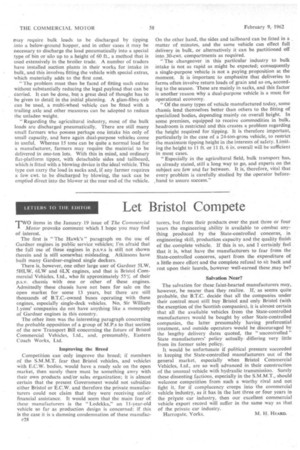Let Bristol Compete
Page 60

If you've noticed an error in this article please click here to report it so we can fix it.
TWO items in the January 19 issue of The Commercial I Motor provoke comment which I hope you may find of interest.
The first is "The Hawk's" paragraph on the use of Gardner engines in public service vehicles; I'm afraid that the full use of these engines in p.s.v.s is still not shown therein and is still somewhat misleading. Atkinsons have built many Gardner-engined single deckers.
There is, however, one other large user of Gardner 5LW, 5HLW, 6LW and 6LX engines, and that is Bristol Commercial Vehicles, Ltd., who fit approximately 55% of their p.s.v. chassis with one or other of these engines. Admittedly these chassis have not been for sale on the open market for some 13 years, but there are still thousands of B.T.C.-owned buses operating with these engines, especially single-deck vehicles. No, Sir William Lyons' companies do not have anything like a monopoly of Gardner engines in this country.
The other item was the interesting paragraph concerning the probable opposition of a group of M.P.s to that section of the new Transport Bill concerning the future of Bristol Commercial Vehicles, Ltd., and, presumably, Eastern Coach Works, Ltd.
Improving the Breed
Competition can only improve the breed; if members of the S.M.M.T. fear that Bristol vehicles, and vehicles with E.C.W. bodies, would have a ready sale on the open market, then surely there must be something awry with their own products and/or sales organization; it is almost certain that the present Government would not subsidize either Bristol or E.C.W. and therefore the private manufacturers could not claim that they were receiving unfair financial assistance. It would seem that the main fear of these manufacturers is the " Lodekka," an 11-year-old vehicle so far as production design is concerned: if this is the case it is a damning condemnation of these manufac
turers, but from their products over the past three or four years the engineering ability is available to combat anything produced by the State-controlled concerns, in engineering skill, production capacity and the quality finish of the complete vehicle. If this is so, and I certainly feel that it is, what have the manufacturers to fear from the State-controlled concerns, apart from the expenditure of a little more effort and the complete refusal to sit back and rest upon their laurels, however well-earned these may be?
Salvation Near?
The salvation for these faint-hearted manufacturers may, however, be nearer than they realize. If, as seems quite probable, the B.T.C. decide that all the companies under their control must still buy Bristol and only Bristol (with the exception of the Scottish companies), it is almost certain that all the available vehicles from the State-controlled manufacturers would be bought by other State-controlled companies, the latter presumably having preferential treatment, and outside operators would be discouraged by the lengthy delivery dates quoted, the " uncontrolled " State manufacturers' policy actually differing very little from its former sales policy.
It would be unfortunate if political pressure succeeded in keeping the State-controlled manufacturers out of the general market, especially when Bristol Commercial Vehicles, Ltd., are so well advanced in their construction of the unusual vehicle with hydraulic transmission. Surely these dissenting factions, especially in the S.M.M.T., should welcome competition from such a worthy rival and not fight it, for if complacency creeps into the commercial vehicle industry, as it has in the last three or four years in the priyate car industry, then our excellent commercial vehicle export record will suffer in the same way as that of the private car industry.
Harrogate, Yorks. M. H. HEARD.
















































































































